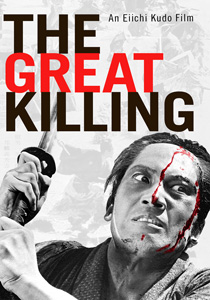Eichi Kudo's follow-up to his The Thirteen Assassins (1963) finds a rag-tag band of conspirators plotting the downfall of a particularly nasty government official (downplayed wonderfully by the great Ryutaro Otomo) in mid-17th century Japan. Getting wind of the plot, the government comes down hard, with a brutal "round up the usual suspects" effort that involves quite a lot of traditional Japanese torture of prisoners involving bamboo and boiling water (for starters … ). The eventual blood-letting of the title provides the film's big ending, although it's a much more chaotic affair than that of Thirteen Assassins. Kudo abandons the highly structured, meticulously planned samurai assault of the previous film for an utterly desperate and unruly free-for-all.
The Great Killing (aka The Great Duel) is a somewhat stranger animal than its predecessor. There's a certain angularity, a kind of cinematic alienation to the proceedings. Long, enigmatic shots from odd angles and frequent use of hand-held camera provide an unconventional air; this is certainly not your typical Toei chambara of the period. Character development is kept to a minimum, so the central characters' motivations are unclear (at first), as is the nature of their relationships to one another. Kotaro Satomi, who you'll remember as the handsome young wastrel of the previous film, is back as innocent samurai bystander Jimbo, who gets sucked into the fray with no choice but to join the conspiracy; the lovely Nami Munakata (in her screen debut) plays the mysterious Miss Miyi, whom everyone wants to sleep with (she is a stunner); Mikijiro Hira, star of Three Outlaw Samurai and Sword of the Beast, plays his standard dissipated cynic; and seasoned character actor Toru Abe is on board as the military strategist behind the Big Killing itself.
As usual, Animeigo offers their top-flight subtitles with interstitial gloss to help you through the more abstruse aspects of Tokugawa-era politics and social etiquette. Animeigo is to samurai films what the Arden editions are to Shakespeare. You're in good hands, never fear. Shimpai gomyo!
MERCY Review: Valiant but Underwhelming Attempt at Screenlife Action
-
Chris Pratt and Rebecca Ferguson star in Timur Bekmambetov's
action-thriller.
[Read the whole post on screenanarchy.com...]
2 hours ago



No comments:
Post a Comment